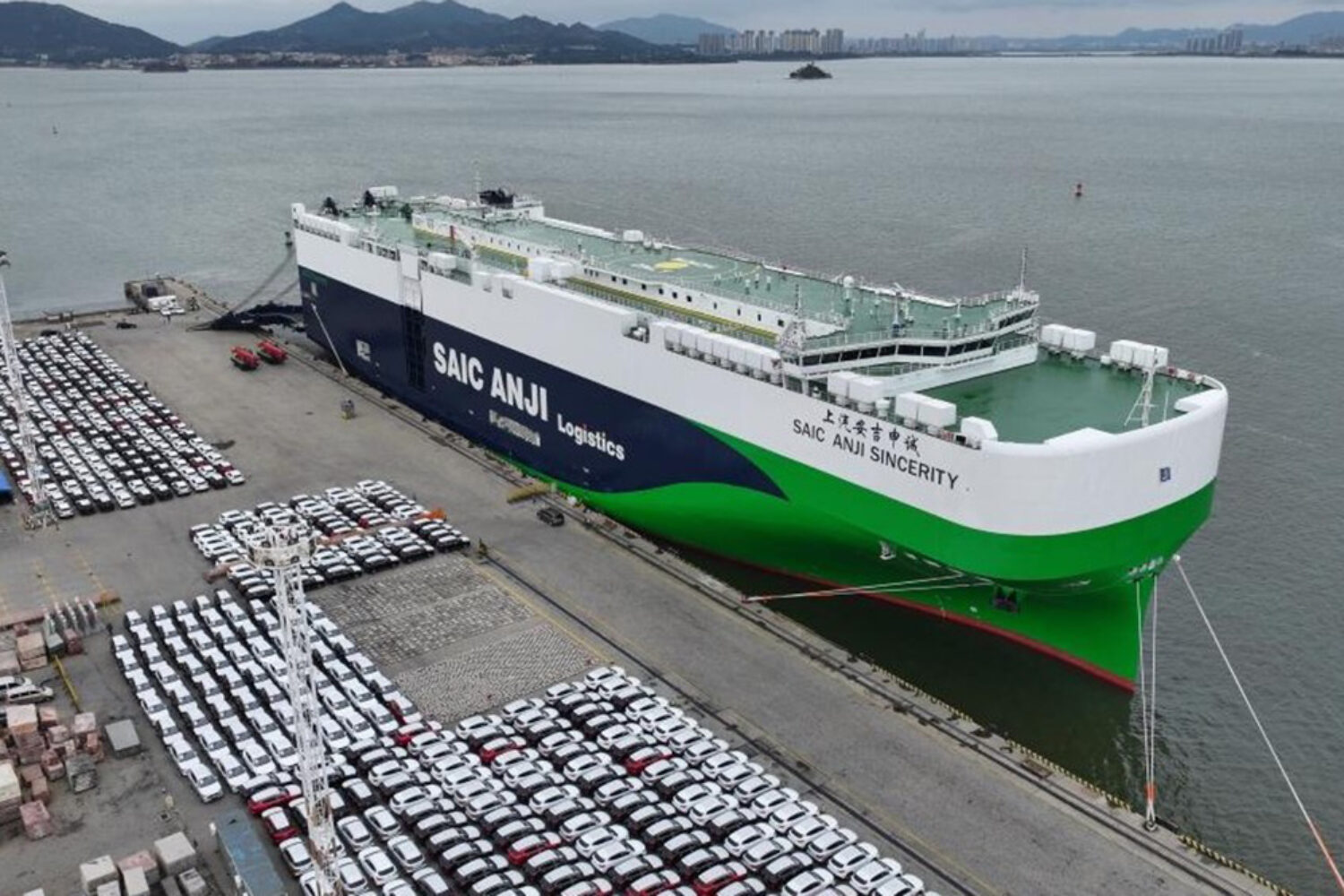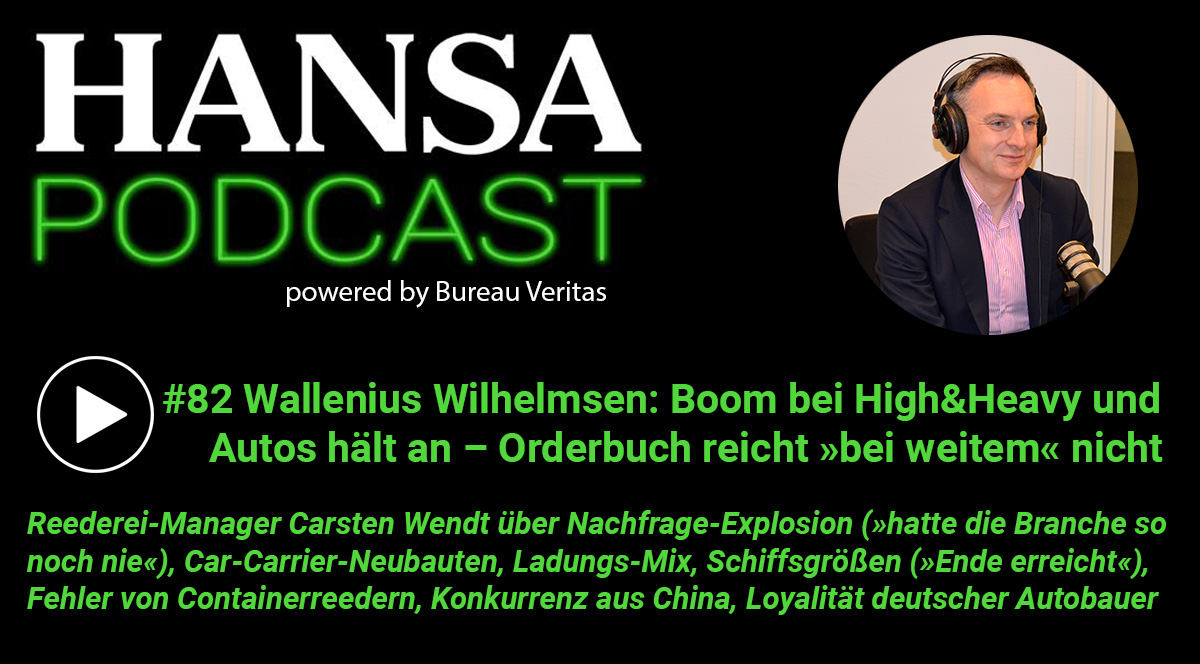It is not only the Chinese car manufacturer BYD Motors that is currently sending its first own car transporter to Europe, 3,000 of which are destined for Bremerhaven. Another major car manufacturer, the Saic Group, is now on its way and is launching the “Saic Anji Sincerity”, currently the world’s largest LNG-powered car transporter.
The Saic ship was built by CSSC Jiangnan Shipyard and has a capacity of 7,600 CEU on its 13 cargo decks, four of which are height-adjustable[ds_preview].
The freighter is powered by an LNG dual-fuel WinGD engine, the tank volume is around 4,000 m³, so that a distance of around 19,000 nm can be achieved at a speed of 18 knots. As reported, the “BYD Explorer No 1” is in operation for BYD with around 7000 electric cars.
According to Saic Motor, the 199.9 m long and 38 m wide “Saic Anji Sincerity”, which has been classified by the China Classification Society (CCS) and DNV, is the world’s largest LNG dual-fuel RoRo vessel currently in operation. The newbuild is designed to transport a wide variety of commercial vehicles and technical equipment. On its current maiden voyage to Europe, over 5,000 different vehicles are being transported, including Saic’s MG and Maxus models as well as vehicles from Dongfeng Motor and Yutong. More than 3,700 cars have now been loaded onto the freighter in the Dongdu port area in Xiamen in the southeastern Chinese province of Fujian alone, which the ship left on January 24 bound for Europe. This was the largest quantity of automobile exports from the port of Xiamen to be loaded onto a ship for a single voyage to date.
Saic call in Bremerhaven
According to a BLG spokeswoman, this Chinese newbuilding will also unload part of its cargo on its maiden voyage at the car terminal in Bremerhaven this spring, but there is no specific call date yet.
Saic Anji Logistics is planning to expand its RoRo fleet by 14 ships over the next three years with a total investment of 10 billion yuan (around 1.4 billion US dollars).
Chinese economic researchers such as Chen Jia from Renmin University believe that the shipping fleets of Chinese car manufacturers are ready to break the long-standing monopoly of foreign shipping companies on key routes and markets and lay a solid foundation for the global development of Chinese car manufacturers. By owning their own ships, this enables car manufacturers to ensure the stability of the export business, reduce transportation costs and guarantee on-time delivery to customers abroad. In Europe, developments are being followed very closely and there is also a need for newbuildings here. On the HANSA PODCAST, for example, Carsten Wendt from Wallenius Wilhelmsen spoke in detail about China as a market and the origin of potential competitors.
The burgeoning expansion of the Chinese maritime fleet is being driven by the rapid growth of Saic’s overseas business, which set a record in 2023 with exports of 1.21 million units, an increase of 18.8% year-on-year. This is the eighth consecutive year that Saic has secured a top position among local car manufacturers.
Among them, new energy vehicles (NEV) in particular accounted for a 24% share in 2023. The relatively affordable MG4 EV has become the best-selling compact electric vehicle in Europe. The MG brand achieved global sales of more than 840,000 units in 2023, securing the title of the best-selling Chinese brand abroad for the fifth consecutive year.
This year marks MG’s 100th anniversary and the declared goal is to achieve one million sales worldwide. MG was a well-known British car brand owned by the MG Rover Group until 2005. The brand rights were then sold to the Chinese Nanjing Automobile, which was taken over by the Shanghai Automotive Industry Corporation (SAIC) in 2007. In the next two years, Saic Motor plans to launch 14 NEV models worldwide.
According to Zhao Aimin, Deputy Managing Director of Saic International, the car manufacturer plans to export 1.35 million vehicles this year and 1.5 million vehicles in 2025. There are also plans to build production facilities where the sales are. This means that the site selection for the first European factory is to be completed this year.
As the world’s largest car exporter, China’s vehicle exports reached 4.91 million units in 2023, an increase of 57.9% compared to the previous year. Although China’s automotive industry is entering a new export era, it faces enormous challenges such as rising charter rates, shipping capacity constraints and fierce competition for car transportation companies. Experts said that the development of shipping fleets is of strategic importance for Chinese car manufacturers and ensures the security and stability of the supply chain.
Bremerhaven will also play an important role as an import port for Chinese car manufacturers. Although only around 10,000 vehicles from Chinese manufacturers were handled at the BLG Autoterminal in Bremerhaven last year, a BLG spokesperson explained, the trend is rising.
“Europe, and Germany in particular, is a relevant target market for Chinese manufacturers. All well-known Chinese manufacturers are now planning to enter the market or expand their market share in Europe. For a transshipment port like ours, these additional flows of goods are important. Bremerhaven is of great importance to Chinese manufacturers as a port of entry into the European market,” continued the BLG spokeswoman, who reported intensive talks between BLG and Chinese manufacturers. (CE)














